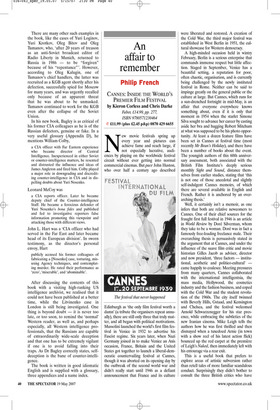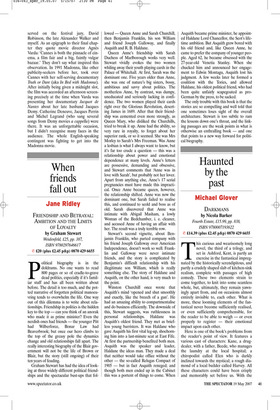An affair to remember
Philip French
CANNES: INSIDE THE WORLD’S PREMIER FILM FESTIVAL by Kieron Corless and Chris Darke Faber, £14.99, pp. 277, ISBN 9780571230464 ✆ £11.99 (plus £2.45 p&p) 0870 429 6655 New movie festivals spring up every year and pictures can achieve fame and reach large, if not especially lucrative, audiences by playing on the worldwide festival circuit without ever getting into normal commercial cinemas. But pace John Huston, who over half a century ago described Edinburgh as ‘the only film festival worth a damn’ (a tribute the organisers repeat annually), there are still only three that truly matter, and all began with political motivations. Mussolini launched the world’s first film festival in Venice in 1932 to advertise his Fascist regime. Six years later, when Nazi Germany joined in to make Venice an Axis occasion, France, Britain and the United States got together to launch a liberal-democratic countervailing festival at Cannes, though it was aborted on its opening day by the outbreak of the second world war and didn’t really start until 1946 as a defiant announcement that France and its culture were liberated and restored. A creation of the Cold War, the third major festival was established in West Berlin in 1951, the cultural showcase for Western democracy.
A high-minded occasion held in wintry February, Berlin is a serious enterprise that commands immense respect but little affection. Staged in September, Venice has a beautiful setting, a reputation for poor, often chaotic, organisation, and is currently being challenged by the newly instituted festival in Rome. Neither can be said to impinge greatly on the general public or the culture at large. But Cannes, which runs for a sun-drenched fortnight in mid-May, is an affair that everyone everywhere knows something about, even if it is only that moment in 1954 when the starlet Simone Silva sought to advance her career by casting aside her bra and hugging Robert Mitchum at what was supposed to be his photo opportunity. At least a dozen feature films have been set in Cannes at festival time (most recently Mr Bean’s Holiday), and there have been a number of books about the event. The youngish authors of this 60th anniversary assessment, both associated with the British Film Institute’s deeply serious monthly Sight and Sound, distance themselves from earlier studies, stating that ‘this is not one of those anecdotal and slightly self-indulgent Cannes memoirs, of which there are several available in English and French. Rather it is anchored by an overarching thesis.’ Well, it certainly isn’t a memoir, as one infers that both are relative newcomers to Cannes. One of their chief sources for the fraught first full festival in 1946 is an article in World Review by Doré Silverman, whom they take to be a woman. Doré was in fact a famously free-loading freelance male. Their overarching thesis is persuasively stated in the argument that at Cannes, and under the influence of the suave film critic and movie historian Gilles Jacob as adviser, director and now president, ‘three factors — institutional, aesthetic and politico-cultural’ came happily to coalesce. Meeting pressures from many quarters, Cannes collaborated with the international intelligentsia, the mass media, Hollywood, the cosmetics industry and the fashion business, and coped with the Cold War and the student revolution of the 1960s. The city itself twinned with Beverly Hills, Gstaad, and Kensington and Chelsea, and the festival welcomed Arnold Schwarzenegger for his star presence, while embracing the subtleties of the new Iranian cinema. Mike Leigh tells the authors how he was first thrilled and then dismayed when a tuxedoed Arnie (in town with a show reel of his latest action flick) bounced up the red carpet at the première of Leigh’s Naked, then immediately left with his entourage via a rear exit.
This is a useful book that prefers to explore areas of artistic subversion rather than retell tales of more familiar scandalous conduct. Surprisingly they didn’t bother to consult the three British critics who have served on the festival jury, David Robinson, the late Alexander Walker and myself. As an epigraph to their final chapter they quote movie director Agnès Varda: ‘Cannes is both the pinnacle of cinema, a film fair and a big, faintly vulgar bazaar.’ They don’t say what inspired this observation. In 1991 Madonna, like other publicity-seekers before her, took over Cannes with her self-serving documentary Truth or Dare (aka In Bed with Madonna). After initially being given a midnight slot, the film was accorded an afternoon screening precisely at the time when Varda was presenting her documentary Jacquot de Nantes about her late husband Jacques Demy. Catherine Deneuve, Jacques Perrin and Michel Legrand (who sang several songs from Demy movies a cappella) were there. It was an unforgettable occasion, but I didn’t recognise many faces in the audience. The whole English-speaking contingent was fighting to get into the Madonna movie.











































































 Previous page
Previous page